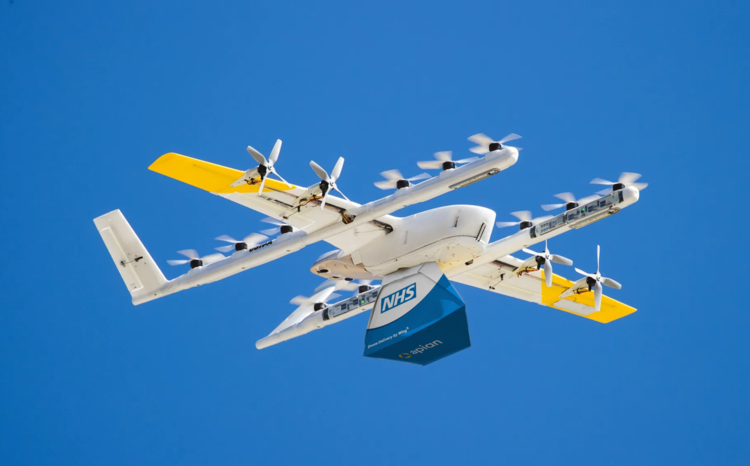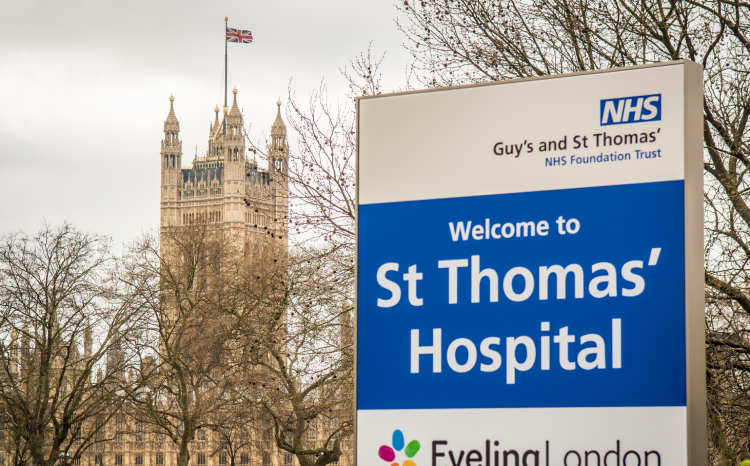Drones to deliver urgent blood samples for Guy’s and St Thomas’
- 17 September 2024

- Urgent blood samples will be transported by electric drones in a medical delivery service in a landmark first for the NHS in London
- The six-month pilot is a partnership between Guy's and St Thomas' NHS Foundation Trust, Apian and Wing
- Moving samples between Guy’s Hospital and the St Thomas’ Hospital lab can take more than 30 minutes by road but less than two minutes by drone
Electric drones will transport urgent blood samples in a six-month trial at Guy’s and St Thomas’ NHS Foundation Trust.
The medical delivery service, in partnership with healthcare logistics firm Apian and Alphabet’s global drone delivery company Wing, is expected to start in Autumn 2024.
Under the pilot, blood samples will be delivered to patients undergoing surgery who are at high risk of complications from bleeding disorders to enable quicker analysis and help to determine whether patients are safe to undergo surgery or be discharged.
Currently, blood samples are delivered by van and motorbike couriers, which can take more than 30 minutes to travel between Guy’s Hospital and the St Thomas’ Hospital laboratory, compared to less than two minutes by drone.
A spokesperson for Guy’s and St Thomas confirmed that the service would not be affected by the cyber attack on Synnovis in June 2024, which has caused months of disruption to pathology services at the trust.
Professor Ian Abbs, chief executive at Guy’s and St Thomas’, said: “The drone pilot combines two of our key priorities – providing the best possible patient care and improving sustainability.
“We are proud to be the first trust in London to trial this innovative approach to help speed up blood sample analysis for our most urgent cases”.
The switch to drone deliveries will also have environmental benefits by removing carbon emissions and reducing traffic congestion.
Sophie O’Sullivan, director of Future of Flight, UK Civil Aviation Authority, said: “Innovative trials like this from Guy’s and St Thomas’, Apian and Wing help demonstrate the many positive and safe ways that drones can be used for society – in this case, to improve patient outcomes and deliver significant environmental benefits.
“This is one of the many reasons that we are working with companies through our sandbox trials programme, to enable the test and development of pioneering new aviation technology in the UK”.
The pilot is regulated by the Civil Aviation Authority, which has granted airspace approval.
Dr Hammad Jeilani, co-founder of Apian, said: “Drones can increase the responsiveness and resilience of healthcare logistics, allowing clinicians to be more productive and patients to get the care they need sooner.
“An NHS drone delivery network in London, starting with this innovative trial, will provide on-demand, automated and sustainable deliveries, helping the NHS create more efficient models of working and our doctors and nurses to deliver the highest quality care for patients”.
Results of a study in Northumbria by NHS Blood and Transplant and Apian, published in the British Journal of Haematology in April 2024, found that drones can be used as a safe mode of transport for delivering blood packs.
Meanwhile, in April 2024, Innovate UK awarded £500,000 to support the Welsh project and four other projects in the health sector that are using drones for delivery of medicines and medical supplies.






